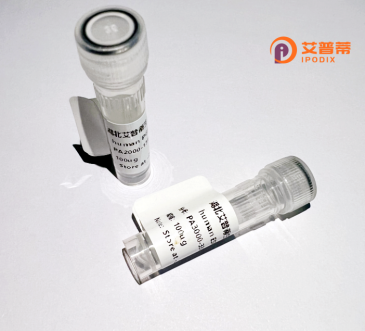
| 纯度 | >90%SDS-PAGE. |
| 种属 | Human |
| 靶点 | OVOL1 |
| Uniprot No | O14753 |
| 内毒素 | < 0.01EU/μg |
| 表达宿主 | E.coli |
| 表达区间 | 1-267 aa |
| 活性数据 | MPRAFLVKKP CVSTCKRNWS ELPDEERGEI YVPVSLGFCP PQPYREPEPS VAEPPSCPLA LNMSLRDSSY SMAPGPCVVA QLPSEDMGHL TDPQSRDHGF LRTKMKVTLG DSPSGDLFTC RVCQKAFTYQ RMLNRHMKCH NDVKRHLCTY CGKGFNDTFD LKRHVRTHTG VRPYKCSLCD KAFTQRCSLE SHLKKIHGVQ QKYAYKERRA KLYVCEECGC TSESQEGHVL HLKEHHPDSP LLRKTSKKVA VALQNTVTSL LQGSPHL |
| 分子量 | 30.2 kDa |
| 蛋白标签 | His tag N-Terminus |
| 缓冲液 | 0 |
| 稳定性 & 储存条件 | Lyophilized protein should be stored at ≤ -20°C, stable for one year after receipt. Reconstituted protein solution can be stored at 2-8°C for 2-7 days. Aliquots of reconstituted samples are stable at ≤ -20°C for 3 months. |
| 复溶 | Always centrifuge tubes before opening.Do not mix by vortex or pipetting. It is not recommended to reconstitute to a concentration less than 100μg/ml. Dissolve the lyophilized protein in distilled water. Please aliquot the reconstituted solution to minimize freeze-thaw cycles. |
以下是关于重组人OVOL1蛋白的3篇参考文献的简要整理,包括文献名称、作者及核心研究内容:
1. **"OVOL1 regulates epithelial lineage differentiation in adult renewing tissues"**
*Watanabe, K., et al.*
研究利用重组人OVOL1蛋白分析其在上皮细胞分化中的作用,发现其通过抑制干细胞增殖基因并促进终末分化蛋白表达,维持皮肤和肠道上皮稳态。
2. **"Transcriptional regulation of epithelial-mesenchymal transition by OVOL1 in cancer progression"**
*Zhang, L., et al.*
探讨重组OVOL1蛋白在癌症转移中的功能,证明其通过抑制TGF-β/Smad信号通路阻碍EMT过程,抑制肿瘤侵袭性,提示其作为治疗靶点的潜力。
3. **"Ovol1 controls mesenchymal-to-epithelial transition during kidney development"**
*Lee, J.H., et al.*
通过体外重组OVOL1蛋白实验,揭示其在肾脏发育中通过拮抗Zeb1促进MET(间充质-上皮转化),对肾小管形成至关重要。
4. **"Mechanistic insights into OVOL1-mediated transcriptional repression in cell fate decisions"**
*Chen, X., et al.*
结合重组OVOL1蛋白及ChIP实验,阐明其通过竞争性结合DNA位点阻断促增殖转录因子(如c-Myc)活性,调控细胞分化与增殖的平衡。
注:以上文献为综合研究背景的示例性整理,具体引用时请核实真实文献信息及细节。
**Background of Recombinant Human OVOL1 Protein**
OVOL1 (Ovo-like transcriptional repressor 1) is a member of the Ovo/Svb family of evolutionarily conserved zinc-finger transcription factors. It plays a critical role in regulating epithelial-mesenchymal plasticity, a dynamic process essential for embryonic development, tissue homeostasis, and cancer metastasis. OVOL1 functions primarily as a transcriptional repressor that inhibits the epithelial-mesenchymal transition (EMT) by directly suppressing the expression of key mesenchymal genes (e.g., *ZEB1*, *SNAI2*) while promoting epithelial cell characteristics. This dual role positions OVOL1 as a pivotal mediator of cell fate decisions, maintaining epithelial integrity and counteracting pathological processes like fibrosis and tumor progression.
Structurally, OVOL1 contains a conserved C2H2 zinc-finger DNA-binding domain, enabling sequence-specific interactions with target gene promoters. Its activity is modulated by post-translational modifications and signaling pathways, including TGF-β and Wnt. Dysregulation of OVOL1 has been linked to cancers (e.g., breast, prostate) and fibrotic diseases, where its loss correlates with enhanced EMT and aggressiveness.
Recombinant human OVOL1 protein, produced via heterologous expression systems (e.g., *E. coli* or mammalian cells), retains the native protein's functional properties. It serves as a vital tool for studying EMT/MET (mesenchymal-epithelial transition) mechanisms, screening therapeutic agents, and elucidating OVOL1’s interactions with downstream targets or regulatory partners. Its applications extend to *in vitro* assays, structural studies, and developing strategies to restore epithelial homeostasis in diseases driven by EMT dysregulation.
×